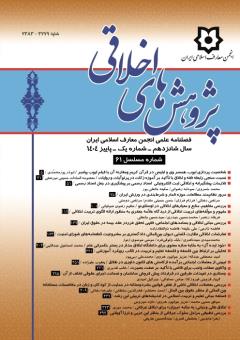بررسی تطبیقی مراحل سلوک عرفانی از منظر ابن عربی و ترزا آویلایی
محورهای موضوعی : اخلاق و تربیت اسلامیزهرا عابدینی 1 , بخشعلی قنبری 2 , عبدالحسین طریقی 3
1 - دانشجوی دکتری، گروه فلسفه و ادیان، واحد تهران مرکزی، دانشگاه آزاد اسلامی، تهران، ایران
2 - گروه فلسفه و ادیان، واحد تهران مرکزی، دانشگاه آزاد اسلامی، تهران، ایران
3 - استادیار، گروه فلسفه و ادیان، واحد تهران مرکزی، دانشگاه آزاد اسلامی، تهران، ایران
کلید واژه: سلوک عرفانی, عزلت , خلوت, ابن عربی, ترزا آویلایی.,
چکیده مقاله :
سیر و سلوک آداب و رسوم و کیفیت مقامات و احوال، و چگونگی در طریقت است و ترقی زندگی روحی را به سیر و سفر تشیبه کردهاند. سالک در سیر و سلوک از همان لحظهای که به راه میافتد و در پی تکمیل خود برمیآید، در راه وصول به منظور و مقصود خود از منازل و مراحل گوناگونی میگذرد. سیر و سلوک طی کردن مراحل جهت تهذیب و تصفیه نفس است؛ و سالک را اهل سلوک و نیز اهل طریقت هم مینامند از آنجایی که در مورد سلوک عرفانی نظرات و انتقادات فراوانی وجود دارد، نویسنده کوشیده است تا دیدگاه ابن عربی و ترزا در مورد سلوک عرفانی را در اثر حاضر بررسی کند. این تحقیق به روش توصیفی - تحلیلی انجام پذیرفته و اطلاعات مورد نیاز با استفاده از روشاسنادی و کتابخانه ای گردآوری و تجزیه و تحلیل شده است. و در نتیجه نهایی تحقیق میتوان گفت ترزا در بیان مراحل، شرایط، روش و نتایج سلوک عرفانی منظم تر و روشمندتر بوده اما شیوه پردازش ترزا کاملاً علمی نیست بلکه بیشتر توصیههایی ناظر به رفتار و تجربه سالکان است. اما ابنعربی شیوهای کاملاً علمی دارد. او فردی است که اهل شهود و مکاشفه است و در دریافت شهود مقام دارد و حال نیست. او در تعبیر و تفسیر شهودها (چه خود و چه دیگران) ید طولانی دارد. ابنعربی حفظ سلامتی جسم در تمام مراحل سلوک را از ضروریات میداند و معتقد است در ریاضت نباید زیادهروی کرد اما ترزا به ریاضت شاقه نیز توجه دارد. هر دو عارف به کسب فضایل اخلاقی توجه داشته که ابنعربی اهم آن را توکل اما ترزا بیشترین تأکید بر تواضع و فرونی دارد. از دیدگاه ابنعربی غایت سلوک روحانی است. سالک الی الله در ابتدای سلوک معرفت به خویش و به تبع آن معرفت به خدا ندارد و در نهایت سلوک و معرفت به نفس مییابد و پی میبرد که خود چیزی جز خدا نیست، که نتیجه سیر و سلوک را خودشناسی و درک وحدت وجود میداند. و ترزا مراحل سلوک را در "کاخ درون" هفت مرحله برشمرده و در نهایت به وحدت شهود رسیدهاست.
The course and conduct of customs and the quality of officials and circumstances, and how they are in tariqat, and the progress of spiritual life has been compared to the course and journey. The seeker in his journey, from the moment he sets out and rises in pursuit of his completion, passes through various houses and stages on the way to reach his goal. The process is to go through the steps to refine and purify the soul; And the seeker is also called Ahl al-Suluk and also Ahl al-Tariqat. Since there are many opinions and criticisms about mystical guidance, the author has tried to examine the views of Ibn Arabi and Teresa about mystical guidance in the present work. This research has been carried out in a descriptive-analytical way, and the required information has been collected and analyzed using documentary and library methods. And in the final result of the research, it can be said that Teresa was more regular and methodical in expressing the stages, conditions, methods and results of mystical conduct, but Teresa's processing method is not completely scientific, but mostly recommendations regarding the behavior and experience of seekers. But Ibn Arabi has completely scientific methods. He is a person who is a person of intuition and revelation and has a position in receiving intuition and is not present. He has a long way of interpreting intuitions (both his own and others). Ibn Arabi considers maintaining the health of the body in all stages of conduct as essential and believes that austerity should not be overdone, but Teresa also pays attention to the austerity of Shagha. Both mystics pay attention to the acquisition of moral virtues, of which Ibn Arabi emphasizes trust, but Teresa emphasizes humility and modesty. From Ibn Arabi's point of view, the goal of conduct is spiritual. At the beginning of his journey, the seeker of Allah does not have knowledge of himself and, consequently, knowledge of God, and at the end of his journey, he finds self-knowledge and realizes that he is nothing but God, and the result of his journey is self-knowledge and the understanding of the unity of existence. And Teresa has listed seven steps in the "Inner Palace" and finally reached the unity of intuition.
